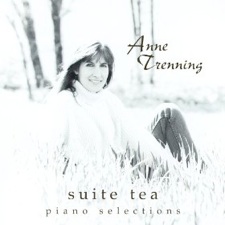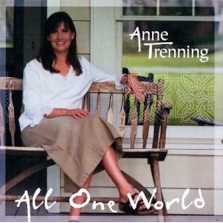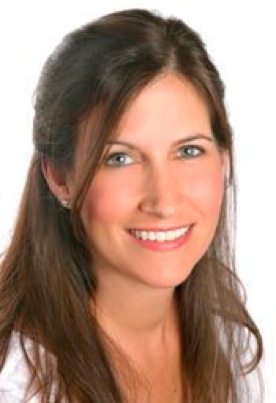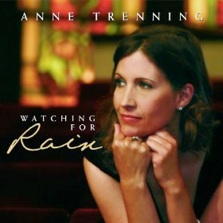For those of you not familiar with Anne, it has been over seventeen years since her debut
Suite Tea back in 1997, which was followed up by 2004’s
All One World. Judging by the sound bytes available on CD Baby it appears her sophomore effort focused on mixing piano performances with lightly orchestrated embellishments. Five years later she followed up this effort with 2009’s
Watching For Rain that continued on with this winning formula with a lavish recording production. She also successfully maintained the balance of creating self-composed songs that sat alongside inspiring renditions of others.
With the continued underlying spiritual content, Anne Trenning successfully blends this with her classical training and love of new age, Celtic, jazz, classic rock, folk and Americana. This is quite a melting pot of musical genres but she successfully merges attributes of each into her own unique musical style. Anne Trenning has been rather quiet over the last five years, but if all goes as planned, 2015 should be quite a year for Trenning fans. Anne was kind enough to take some time recently to update Mainly Piano to talk not only about her immediate future but also questions about her past recordings.
MD: I see you are from the Chicago suburbs of Barrington, Illinois. That was my old stomping grounds from college days. What influence if any did the city of Chicago have on you?
Anne: I grew up in Barrington, IL, a suburb northwest of Chicago. Chicago is a dynamic city with excellent cultural and historical offerings. My father grew up in the city and has extended family in the Chicagoland area. We were close and they shaped many of my earliest perspectives. Their roots are Dutch, and a diligent work ethic coupled with a staunch religious compass comprised their life philosophies. My parents selected Barrington because of the excellent public school system. We had wonderful music programs in our schools and I participated in a number of ensemble activities. Church related activities such as choir were always part of the schedule, and private music lessons as well. My piano teacher Helen Velleuer had a tremendous impact on my future pursuits. She defined the term compassionate educator. I was fortunate to know her as a teacher and a friend.
MD: Your diverse musical style is reflected by your covers of Zeppelin’s “Rain Song” on your debut Suite Tea to the Tim Hughes penned praise song “H.I.A.T.W” on Watching For Rain. Your website bio describes you as a blend of classical with a love of new age, gospel, Celtic, jazz, classic rock, folk and Americana. Where do all these influences come from?
Anne: Like a lot of people, my earliest musical memories are listening to my parents’ record collection. While my parents enjoyed music, theirs was not a vast collection. Mahalia Jackson was a favorite. I listened to her music at a young age and have always loved gospel music since. Soon enough the radio took up most of my attention and I gravitated towards pop music early on. Growing up on the cusp of the seventies singer songwriter heyday definitely influenced my listening ear. Yet we were eighties kids so we found ourselves involved with emerging genres, and hard rock, heavy metal, and early punk also influenced what we listened to at the time. It wasn't until I moved south that I cultivated a greater appreciation for folk, Americana, Celtic, bluegrass, southern rock, and country. These roots oriented genres, while new to me, were part of the musical lexicon of this area. I fell in love with their melodic sensibilities and the "one foot firmly rooted in the past" relationships they explore. Simultaneously Windham Hill and Narada artists were emerging on the musical scene. The combination of these various influences are all found somewhere within my original composition. But structurally, it is my classical background that has the greatest impact on my songwriting. There were countless years of study under talented educators that regimented my perspective. I will always resolve my compositions to tonic, regardless of how purposefully I try otherwise. Maybe a deceptive cadence on the rare occasion.


Click the album covers above and below to read Michael's reviews.
MD: Your debut album though including a core band was largely stripped down to piano performances and minor embellishments here and there. Was this a reflection of where you were at the time or as a result of a budget restriction?
Anne: Probably more of a reflection of where I was at the time. Once I wrapped up my undergraduate education I was not overly involved with music for a number of years. I started working full time and neither owned or could accommodate a piano in my life. But a few years down the road things changed and my mother gave me our family piano. Suddenly I was presented with the opportunity to practice but lacking in a practice regiment. After reworking most of my earlier repertoire I found myself experimenting more freely at the keyboard and in time began crafting original melodies and composing. Over time I put together a small collection and went in search of somewhere to record these works. This is how I crossed paths with my first producer Dave Moody. Dave's influence can be found in these early arrangements and I am grateful to him for “hearing” something in my work worth pursuing. I met Rick Dior as I searched for a studio offering a piano best suited my style. Rick and I truly clicked in terms of our classical backgrounds, and I was, and continue to be, simply amazed by his expertise and professionalism in all things music. It was Rick who later introduced the orchestrated arrangement process we utilize when constructing my recordings.
MD: While your cover of the previously mentioned “Rain Song” was intriguing Suite Tea appears to be anchored by its most upbeat and longest track “Long Way From My Home”. The band does not make their full introduction until almost 2 minutes into the song. Tell me more about this progressive composition.
Anne: When I revisit my work through the years it is apparent how my compositional tendencies have been shaped and molded. In work from my earlier years I hear a less structurally defined process, and one that is more reliant on theatrics to create melody. I have a number of other compositions crafted during the same period as "Long Way From My Home" that have never made it onto a recording. Most of these works are large in nature, long in length, and cinematic in presentation. I would love the opportunity to perform them one day. But they were too extensive for Suite Tea and only "Long Way From My Home" made the cut. I enjoy the narrative nature of this song, and also how it is a composite of my earlier songwriting inclinations. "The Rain Song" is simply one of my favorite melodies and in my opinion certainly one of the most outstanding songs Led Zeppelin crafted. Whenever I play this song in a live setting someone always approaches me with a smile and nod of recognition. It's a classic.
MD: It took you six years to follow up your impressive debut. In hindsight do you think you lost any momentum waiting so long?
Anne: Well when I started on this journey I wasn't really aware of future opportunities that would be available. As such, I wasn't so much concerned with momentum as I was the learning curve occurring along the way. My songwriting process is fairly organic. Rarely have I sat at the piano with the intent to create a song inspired by a current event or situation. More often for me is a scenario where I am playing around on the keyboard and suddenly a melody or a progression just sort of pops out. Further exploration of this motif will then result in some type of chorus or verse pattern, and with repetition the composition takes shape over time. This process is less oriented towards output, and it can take years to create enough material to comprise a recording. Lately I've started considering the possibility of single releases, but I like the idea of a composite work that offers an artistic vision. Something with a trajectory from beginning to end that fits together seamlessly, presenting an even greater unified whole. These are my goals for every new recording. It's difficult to let go of historical patterns in this regard.
MD: Your sophomore effort All One World followed in the footsteps of your debut combining stripped down performances countered by embellished material. This time around you appeared to be more focused on the Celtic genre. Was this intentional and if so why?
Anne: I have such an affinity for Celtic music. The nature of the instrumentation, the evocative simplicity of the melody lines, the contrasting harmonies which elevate melodies into divinely inspired expressions, the scenic locales from which this genre emerged, all move and astound me with their intrinsic beauty. Usually, in the process leading up to a new recording, one or two Celtic themed compositions emerge. I am always delighted with these projects as they tend to be more up-tempo and ebullient in nature than my other work. They involve a finger dexterity that makes playing them joyful and challenging. All One World was crafted primarily during the early years of my children's lives. We listened to lots of music together and they too were drawn to the infectious, delightful nature of this genre. I think a lot of that time spent together is reflected in this particular recording. Of course the ballads from this genre are unparalleled in their emotive nature. "Ben's Song" and "Clarecastle" are an attempt on my part to create something that aspired to the ethereal repertoire of the Celtic genre.
MD: Your third effort was entitled Watching For Rain which would suggest a gloomy and despairing affair. But from artwork to musical content it was a very optimistic one. Would you care to elaborate on the album title?
Anne: Watching For Rain is really a musical metaphor for the concept of hopefulness. Rain in the context of its most desired quality, its rejuvenating effect, its blessing of necessity. The cleansing nature of a good downpour, the chance to start fresh, the opportunity for reprieve from the relentless, all of these concepts went into the title. There are quotes scattered throughout the liner notes of the recording that reflect this sentiment. One of my favorites is Langston Hughes..... "Let the rain kiss you, let the rain beat upon your head with silver, liquid drops, let the rain sing you a lullaby." The period in my life which preceded the creation of this recording was fairly tumultuous. I was seeking and simultaneously grateful to find reprieve from the difficulties which had arisen. Rain, in its infinite cleansing capacity, was the necessary element to transition to the next step. Music, like rain, suffuses the world in beneficent grace.
MD: Curious inclusion on Watching For Rain was a revisitation of “Eden Hall” that you initially recorded on your debut. Were you not happy with your initial recording of this particular song?
Anne: I wanted the opportunity to revisit the arrangement for “Eden Hall”. This is one of my favorite pieces, and it seemed an opportune time to have it reworked. Dave Moody crafted the original arrangement on Suite Tea, so I was interested in seeing what Rick Dior could envision, and also to have some of the wonderful musicians working with us at the time, like Jane Brendle, lend their insights.
MD: Two standout tracks on Watching For Rain are the waltz driven “Carolina Moon” and the gorgeous “And I’ll Fly Away”. Tell me a little more about their origins and creative inspirations.
Anne: "Carolina Moon" seemed the perfect title for this upbeat track. I love the contained nature of the arrangement and the parlor room sensibility of the instrumentation. Again, Rick and I both come from classical backgrounds, and Rick is a percussionist. When recording, he had me pull back from my original tempo slightly to create a more elegant and contra dance like approach to the overall structure. "And I'll Fly Away" is a song which is musically introspective and emotionally charged. It deals with existential concepts and releasing control. This particular song most greatly reflects ongoing challenges at the time.
MD: While I do not have access to your sophomore album All One World both your debut and your most recent album include the scripture verse Joshua 24:15 and Isaiah 58:11 respectively. Are these verses limited to inspiring words or is there a faith driven aspect behind them that would warrant you to share this with the general public?
Anne: I like to include a scripture quote in the liner notes of my recordings. Sacred music has played an important role in my musicality and education. Church was always part of the passage of time and the structures it provides via scripture are empowering and enlightening. These passages resonated with me, and offer a window into the musical message of each recording.
MD: While your first two albums were well produced there is no doubt that Watching For Rain reflected a richer musical production. All three of your albums were recording at the Acoustic Barn Studios. Your debut album included Rick Dior as an additional engineer who has graduated to producer as well being credited for arrangement, orchestrations and percussion on your latest album Watching For Rain. Tell me a little more about this growing musical partnership?
Anne: It really isn't an overstatement to say that I wouldn't be a recording artist without the professional assistance of my friend Rick Dior. I have elaborated as to how we met and continue to work together. What I haven't espoused nearly enough is the sheer genius of Rick's innate musicality. He is talented beyond measure, professional in every capacity, driven by perfection and meticulous attention to detail, and devoted as a friend when it comes to allocating his professional time to my endeavors. His technical intuition is enviable, effortless, and defined. Our work together continues to evolve and I have no doubts that our best efforts are still on the horizon. Lastly, he has a fantastic sense of humor. We have laughed together through the evolution of these recordings, and learned about genuine friendship via music and life. His studio is "The Acoustic Barn" in Charlotte, NC.
MD: You credit yourself as Executive Producer on your last album. How involved were you with the production process?
Anne: Pretty much every step of the way. One area where I lack initiative and expertise is in a digital/technical capability. I much prefer to employ others with knowledge of these processes, so I cannot in good conscience take credit for anything involving technology or its manipulation. But every other step of the process I am there with my ideas and conceptual perspective.
MD: So what does your recording schedule look like? Anything on the agenda?
Anne: I couldn't be more excited to announce that I have two new projects to release. The first one will be a solo piano recording. I traveled to Sedona to record this project and it was such a fantastic experience. What a beautiful, inspirational area of the country. The second project is still "in progress" so it remains unknown when it will reach completion but we are over halfway finished. I am beyond lucky to be collaborating with some extraordinary musicians on this recording. There are a number of cover tunes that I feel are some of the best interpretations of the original concept that I have heard. I am really excited about the scope of this project.
MD: No disrespect to producer Will Ackerman who seems to have his producing hand on every other artist, but Imaginary Road Studio is in Vermont not Sedona, Arizona so that rules out Mr. Ackerman. It is also not the home of Rick Dior’s Acoustic Barn Studio. Care to give an inside glimpse to your Mainly Piano readers as to who is producing your upcoming recordings?
Anne: Absolutely. I am fortunate to be an artist on Pandora, and often when listening I would come across the music of Joe Bongiorno. His studio "Piano Haven" is located in Sedona, AZ. The tonality of his recordings, the clarity and warmth, the pristine quality of the acoustics, all led me to reach out to him and inquire about his studio and piano. Rick Dior has a fantastic Kawai at "The Acoustic Barn," but "Piano Haven" offers a Shigeru Kawai that is truly a gift to keyboardists. It possesses a magical quality and craftsmanship which opens new boundaries for exploration. It is a superior instrument and Joe is an outstanding studio professional. He too possesses vast technical knowledge and a clever sensibility when it comes to getting work accomplished. It was a true pleasure to record there and I am thrilled that I took the opportunity to expand my horizons in this regard. Rick Dior is producing the project which will follow.
MD: You Tube currently has a posting of you playing in an empty concert hall to a song entitled “Do I Hear Christmas” which is not featured on any of your past recordings. The posting appears to have occurred late last year. Is this a song that will be featured on either one of your upcoming recordings?
Anne: Yes - you are correct. This song will be located on a future release. I like to add a Christmas song on each project in a way that somehow reaches outside of the holiday season and is appropriate year round. This particular song actually has lyrics and we will be doing a vocal arrangement recording as well as an instrumental version. I haven't decided if the vocal arrangement will be a single, or included as a bonus track on the future release. I rarely write lyrics but occasionally they emerge in the process. This song is really more of an R&B ballad using Christmas as a metaphor for falling in love, than an actual holiday inspired song. It's a personal favorite and Mae Allen, the vocalist, is perfection.
MD: In this particular video you are playing on a Steinway & Son’s piano. Is this your preferred manufacturer? If so why? If others, why them?
Anne: We recorded the video with Watson Productions at my alma mater Converse College, in Spartanburg, SC. Converse is a Liberal Arts College with a Professional School of Music that is designated as a Steinway School of Distinction. We were fortunate to be able to work with John Watson and crew to produce this effort. My personal keyboard preference is either a Yamaha or a Kawai. I have played some amazing Steinway instruments, including a Dakota Jackson design that was superb in every regard. But the action, acoustic articulation, and melodic character of my two preferences have secured my devotion
MD: Your website makes no mention of past present or upcoming performances. Has there been any opportunity to complete this? Any chance America will get to see Anne Trenning play in the near future?
Anne: I can only hope this possibility makes itself more available in the future. A full teaching schedule and two children keep me fairly tethered to commitments in my general locale. But I would love to share my music on a larger stage one day, and I hope to have the opportunity to pursue this goal when time allows.
MD: Finally, thank you for taking the time to speak with Mainly Piano during your summer time and wishing you a great remainder of the year.
Anne: Thank you Michael. I absolutely appreciate the chance to share with your audience. Thanks for the excellent platform provided by you and your colleagues to musicians worldwide. Your efforts are invaluable us all!
For more information about Anne Trenning and her music, please visit
her website and her
Artist Page here on MainlyPiano.com.
Michael Debbage
November 2014



